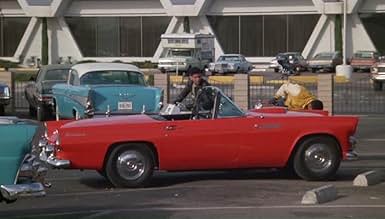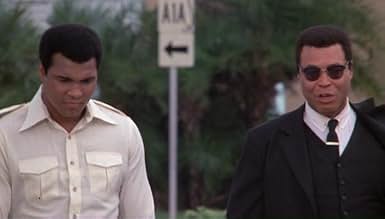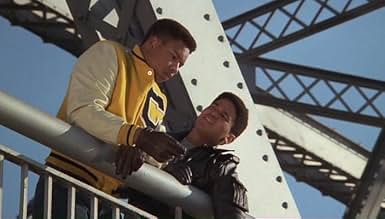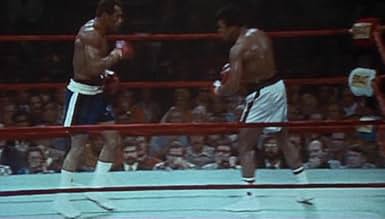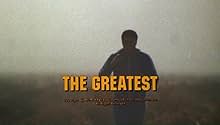PUNTUACIÓN EN IMDb
5,9/10
1,7 mil
TU PUNTUACIÓN
Añade un argumento en tu idiomaMuhammad Ali plays himself in a reconstruction of the events that brought him to fame.Muhammad Ali plays himself in a reconstruction of the events that brought him to fame.Muhammad Ali plays himself in a reconstruction of the events that brought him to fame.
- Dirección
- Guión
- Reparto principal
- Premios
- 2 premios en total
Teddy Wilson
- John the Gardener
- (as Theodore R. Wilson)
Chip McAllister
- Cassius Clay - Aged 18
- (as Phillip 'Chip' McAllister)
Drew Bundini Brown
- Drew 'Bundini' Brown
- (as Drew 'Bundini' Brown)
Reseñas destacadas
The original (and nominal) director here, Tom Gries, died of a heart attack while the film was still in production; somewhat perversely, Monte Hellman (who usually had to struggle to set-up his own personal projects) seemed like the go-to-guy in similar situations – since he would be assigned similar 'doctoring' duties on AVALANCHE EXPRESS (1979), whose own viewing preceded this one! While it was most probably green-lit in the wake of the boxing sleeper hit (and surprise Oscar triumph) ROCKY (1976), earlier in the decade another film on a black champ within this particular sporting field had emerged i.e. THE GREAT WHITE HOPE (1970) – in which James Earl Jones had been Oscar-nominated for his turn as Jack Johnson and who, here, turns up briefly as yet another controversial historical figure, Malcolm X (himself the subject of a 1992 film, where he would be interpreted by Oscar contender Denzel Washington).
Anyway, it was a rarity to have the protagonist of a biopic played by the man himself; legendary Muhammad Ali – formerly known as Cassius Clay – 'performs' adequately enough under the circumstances (though some disparagingly opined that he was unconvincing!), so much so that he would later star in the made-for-TV American Civil War epic FREEDOM ROAD (1979). For the record, his life-story would also be treated in a number of documentaries, such as a.k.a. CASSIUS CLAY (1970) and the Oscar-winning WHEN WE WERE KINGS (1996) – both of which I own but have yet to check out – as well as Michael Mann's more thorough feature ALI (2001; for which star Will Smith would also be up for a Best Actor Oscar). Incidentally, the name-change was from Clay to Ali occurred when he changed his faith from Christianity (rejecting it for being "the white man's religion 'mandating' that the black man suffer while on Earth and reap his rewards in the afterlife"!) to Muslim (the boxer's association with the revolutionary Malcolm X would be frowned upon by his promoters, while Ali's pacifist views would land him in trouble with the authorities when he refused to be drafted in the Vietnam War, whereupon he was stripped of his titles!).
Thankfully, the script (by sports authority Ring Lardner Jr. and an uncredited Bill Gunn, perhaps best-known for his radical take on the vampire theme with GANJA & HESS {1973}) does not whitewash its subjects, depicting Ali as misogynistic (liberally seducing white women and dominating those of his own color) and brash (openly aggravating his opponents in order to throw them off-balance) and Malcolm himself as delusional. The heavyweight bouts themselves are presented briefly via stock footage, with more time allotted to the 1974 "Rumble In The Jungle" with Ali making a spectacular comeback facing George Foreman (actually exclusively dealt with in the afore-mentioned WHEN WE WERE KINGS – by which time the protagonist would have become afflicted with Parkinson's Disease, though he did turn up unannounced at the awards ceremony!) and which ends THE GREATEST itself on a high note. Such powerful moments are intermittently felt throughout, but the end result does not really prove the compelling portrayal that was clearly intended!
In fact, among its deficiencies, one has to include the movie's soundtrack – composed of equal parts sappy songs by George Benson (notably "The Greatest Love Of All") and a pulsating score (during the ROCKY-type training sessions) that are very evocative of its era, that is to say, feel dated at this juncture! Nor is the film helped in any noticeable way by the star-studded supporting cast – highlighting Ernest Borgnine (as Ali's trainer), John Marley (his doctor), Robert Duvall (the afore-mentioned flustered promoter), Ben Johnson (as an early supporter), a thinned-down Paul Winfield (as his defence counsel) and Roger E. Mosley (as Sonny Liston, the heavyweight champ he first lost to and then triumphed over).
Anyway, it was a rarity to have the protagonist of a biopic played by the man himself; legendary Muhammad Ali – formerly known as Cassius Clay – 'performs' adequately enough under the circumstances (though some disparagingly opined that he was unconvincing!), so much so that he would later star in the made-for-TV American Civil War epic FREEDOM ROAD (1979). For the record, his life-story would also be treated in a number of documentaries, such as a.k.a. CASSIUS CLAY (1970) and the Oscar-winning WHEN WE WERE KINGS (1996) – both of which I own but have yet to check out – as well as Michael Mann's more thorough feature ALI (2001; for which star Will Smith would also be up for a Best Actor Oscar). Incidentally, the name-change was from Clay to Ali occurred when he changed his faith from Christianity (rejecting it for being "the white man's religion 'mandating' that the black man suffer while on Earth and reap his rewards in the afterlife"!) to Muslim (the boxer's association with the revolutionary Malcolm X would be frowned upon by his promoters, while Ali's pacifist views would land him in trouble with the authorities when he refused to be drafted in the Vietnam War, whereupon he was stripped of his titles!).
Thankfully, the script (by sports authority Ring Lardner Jr. and an uncredited Bill Gunn, perhaps best-known for his radical take on the vampire theme with GANJA & HESS {1973}) does not whitewash its subjects, depicting Ali as misogynistic (liberally seducing white women and dominating those of his own color) and brash (openly aggravating his opponents in order to throw them off-balance) and Malcolm himself as delusional. The heavyweight bouts themselves are presented briefly via stock footage, with more time allotted to the 1974 "Rumble In The Jungle" with Ali making a spectacular comeback facing George Foreman (actually exclusively dealt with in the afore-mentioned WHEN WE WERE KINGS – by which time the protagonist would have become afflicted with Parkinson's Disease, though he did turn up unannounced at the awards ceremony!) and which ends THE GREATEST itself on a high note. Such powerful moments are intermittently felt throughout, but the end result does not really prove the compelling portrayal that was clearly intended!
In fact, among its deficiencies, one has to include the movie's soundtrack – composed of equal parts sappy songs by George Benson (notably "The Greatest Love Of All") and a pulsating score (during the ROCKY-type training sessions) that are very evocative of its era, that is to say, feel dated at this juncture! Nor is the film helped in any noticeable way by the star-studded supporting cast – highlighting Ernest Borgnine (as Ali's trainer), John Marley (his doctor), Robert Duvall (the afore-mentioned flustered promoter), Ben Johnson (as an early supporter), a thinned-down Paul Winfield (as his defence counsel) and Roger E. Mosley (as Sonny Liston, the heavyweight champ he first lost to and then triumphed over).
I said several months ago that no one could play Ali except Ali. I was right. Muhammad Ali does a magnificent job playing himself in this movie. Maybe he's no actor, but in this case he accomplished what he set out to do, and he had several really effective scenes, such as when he explained why he didn't want to go to Vietnam, and the scene where Clay demanded that he no longer be called by that slave name.
This was the third film (as opposed to documentary) that I saw on the life of the great boxer. David Ramsey did an okay job in the first one, and Will Smith tried his best but didn't quite capture the champ as only the champ could. Smith may have been the best actor out of the three, and certainly his film was the best.
Chip McAllister made young Cassius Clay too much of a clown. He was okay, I guess, but the portrayal of the character improved dramatically at one point, and I also noticed the actor looked so much more like Clay. That's when I remembered: Ali himself was playing the character.
Ernest Borgnine did a capable job as Ali's trainer, but this was not one of his best performances. James Earl Jones did a fine job as Malcolm X, brief as the performance was.
I learned a few new details about Ali's life I didn't know before. I also found out that 'The Greatest Love of All' was written long before Whitney Houston made it a hit.
The main reason for watching this movie was Ali himself. He was the greatest.
This was the third film (as opposed to documentary) that I saw on the life of the great boxer. David Ramsey did an okay job in the first one, and Will Smith tried his best but didn't quite capture the champ as only the champ could. Smith may have been the best actor out of the three, and certainly his film was the best.
Chip McAllister made young Cassius Clay too much of a clown. He was okay, I guess, but the portrayal of the character improved dramatically at one point, and I also noticed the actor looked so much more like Clay. That's when I remembered: Ali himself was playing the character.
Ernest Borgnine did a capable job as Ali's trainer, but this was not one of his best performances. James Earl Jones did a fine job as Malcolm X, brief as the performance was.
I learned a few new details about Ali's life I didn't know before. I also found out that 'The Greatest Love of All' was written long before Whitney Houston made it a hit.
The main reason for watching this movie was Ali himself. He was the greatest.
After seeing several disappointing biopics featuring Ali I have no fear in saying this is one of the better movies featuring the great man . The film is helped by a script that tells of young Clay`s struggle against prejudice and discrimanation without going overboard , and the script to its credit doesn`t concern itself with deep discussions of Ali`s psyche unlike a few movies I could mention , here the script just concentrates itself with hard facts . By a strange irony the film is less effective when Ali appears playing himself but that`s probably down to Ali having a bit too much fun reliving his past like turning up at Sonny Liston`s house at the dead of night to throw insults , but you can`t really blame Ali for enjoying himself , he was a remarkable man who had many remarkable moments in his life
You probably won`t learn anything new about Ali watching this film , but you can be certain that it`s all true
You probably won`t learn anything new about Ali watching this film , but you can be certain that it`s all true
Ali plays himself impressively in this biography of his remarkable boxing career. The greatest commands the screen alongside such actors as Robert Duval, Ernest Borgnine and James Earl Jones. The film is not as powerful, moving or exciting as it could have been and so is a slightly disappointing dramatization of a legendary boxing story. But, of course, just to see Ali doing what he does best (entertaining out of the ring as well as in) is a must for most. So, see it.
I have read some of the other reviews and their negative criticism of Ali's acting talents but the reality is Ali invented "hype" and "rapping" which both were reflected in this autobiographical film from his teenage years as the 1960 Boxing heavyweight Gold Medal winner through to his 1974 upset win of the heavy hitting George Foreman in Zaire, Africa.
Just like in all his incredible boxing matches this film packs a lot of punch in its.101 minutes of film run time. I wish people would look at what the film includes rather than what the film is lacking. Muhummad Ali was the greatest fighter and influential person of the 21st century. How can anyone say he is a bad actor when he is playing himself?
Just like in all his incredible boxing matches this film packs a lot of punch in its.101 minutes of film run time. I wish people would look at what the film includes rather than what the film is lacking. Muhummad Ali was the greatest fighter and influential person of the 21st century. How can anyone say he is a bad actor when he is playing himself?
¿Sabías que...?
- CuriosidadesThe film's theme song, "The Greatest Love of All", which was written and recorded to be the movie's main theme, is sung by crooner George Benson and is played during the opening credits of this movie.
- PifiasMuhammad Ali is shown fighting Joe Bugner during the montage of bouts that took place between the first Joe Frazier fight in 1971 and the first Ken Norton fight in 1973. However, the footage actually is taken from the second fight with Bugner in 1975 instead of their first fight in 1973. Not only is this out of sequence for the montage, but the second Bugner fight occurred after the Ali vs. George Foreman fight in 1974 which is the climax of the film.
- Citas
Drew 'Bundini' Brown: Float like a butterfly and sting like a bee. You can't hit what you can't see.
- Banda sonoraThe Greatest Love of All
(main title song)
Sung by George Benson
Music by Michael Masser
Lyrics by Linda Creed
Selecciones populares
Inicia sesión para calificar y añadir a tu lista para recibir recomendaciones personalizadas
- How long is The Greatest?Con tecnología de Alexa
Detalles
- Fecha de lanzamiento
- Países de origen
- Sitio oficial
- Idioma
- Títulos en diferentes países
- El más grande
- Localizaciones del rodaje
- Empresas productoras
- Ver más compañías en los créditos en IMDbPro
Taquilla
- Recaudación en Estados Unidos y Canadá
- 8.284.000 US$
Contribuir a esta página
Sugerir un cambio o añadir el contenido que falta

Principal laguna de datos
By what name was Yo, el mejor (1977) officially released in India in English?
Responde

